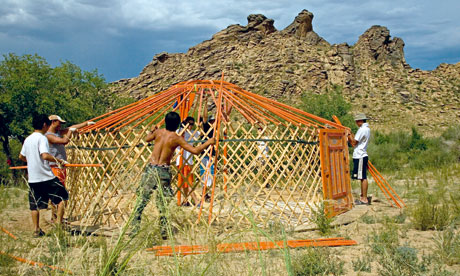
"You have conversations and interactions you simply couldn’t have as a traveller". Des Gould, Business Consultant, 55
Earthwatch is an international environmental charity that researches ecosystems, climate change, cultural heritage, things like that, and uses a mixture of professionals and ‘citizen scientists’ to carry out its research.
The project I was part of for two weeks was in Mongolia’s Gobi desert, in a place called Ikh Nart. The great strength of being part of Earthwatch is that over the two weeks we were on the project we could do pretty much anything. We started by counting the population of argali sheep as part of a research project into pressures on the ecosystem, but we also went to a vulture’s nest and measured chicks; we looked at small mammals like gerbils and hamsters that form the main bulk of the food chain; we looked at different plant species, and so on. We had a lot of choice.
One of the great things is you’re out there in the desert and you get to talk to nomads. Of course you’ve got interpreters, but you’ve got the credibility of being part of a research group that’s been there for 10 years – you’re a known quantity, and therefore you can have conversations and interactions that you couldn’t have as a tourist or a casual traveller. That was incredibly valuable. Plus about half of the researchers were made up of Mongolian students, so there was good integration.
I remember one time being in the camp on my own as the sun went down, with a feeling of absolute peace and solitude in the desert as the night drew in. Most of Mongolia’s on a plateau about 4,000ft above sea level, and the stars you see are phenomenal. I just sat there watching shooting stars, it was fabulous.
It’s also interesting to live in a landscape where there are no fences, no boundaries, no hedges, no walls, nothing. It’s very, very strange. There is a sense of tremendous freedom, but it makes me more aware of landscapes here in the UK and the way we parcel them up.The other thing I really liked was the feeling that you are contributing to the sum of knowledge of what we do and don’t know about some of the last remaining wild places. For example, one discovery they’ve made out here is that juvenile vultures actually migrate. They tagged them and found them as far away as Korea, about 2,000 miles away. Nobody knew that before. It’s true that what you can contribute in two weeks is limited, but it’s still something.
Earthwatch is a big organisation and they’ve got things going on all over the world, so if the Gobi desert doesn’t appeal there are bound to be places that do. There are research projects that are both more and less strenuous, so there’s something for everyone really.